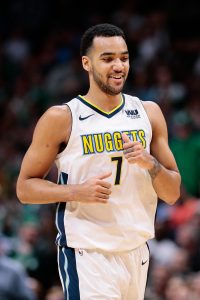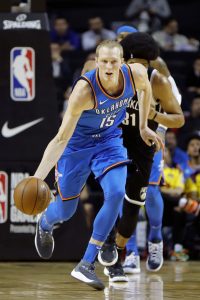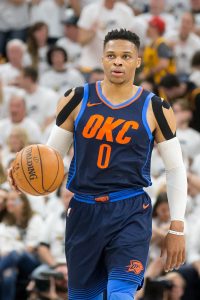NBA teams have now completed the brunt of their offseason work, with the draft and free agency practically distant memories. Still, with training camps more than a month away, most clubs around the league have at least one or two outstanding issues they’ve yet to address.
We’re in the midst of looking at all 30 NBA teams, separating them by division and checking in on the key outstanding question that each club still needs to answer before the 2018/19 regular season begins.
After focusing on the Atlantic, Central, and Southeast last week, we’ve moved to the Western Conference this week, starting with the Southwest and Pacific. Today, we’re finishing things off by focusing on the Northwest…
 Denver Nuggets
Denver Nuggets
Will the Nuggets sign Trey Lyles to a rookie scale extension?
The trade that sent Lyles to Denver won’t exactly go down as one of the great moves in Nuggets history, considering it cost the team the lottery pick that became Donovan Mitchell in last year’s draft. Still, don’t hold that against Lyles, who enjoyed a breakout year in 2017/18, establishing new career bests in PPG (9.9), RPG (4.8), FG% (.491), and 3PT% (.381) as one of the first players off Denver’s bench.
Lyles is eligible for a rookie scale extension up until October 15 this year, and while role players generally aren’t strong candidates for early deals of that nature, it’s a possibility worth considering for the Nuggets. Lyles is still just 22 years old, and if the club views him as one of its long-term building blocks, it could make sense to lock him up now before his role and his numbers increase further.
Unless they plan to exercise Paul Millsap‘s $30MM team option next summer, the Nuggets should have cap flexibility going forward, meaning a Lyles extension wouldn’t hamstring them. With Nikola Jokic, Gary Harris, and Will Barton already secured to long-term deals, the Nuggets will have to decide whether they want Lyles to join that group now, or if they’ll take their chances with him in restricted free agency in 2019.
Minnesota Timberwolves
When will the Timberwolves sign Karl-Anthony Towns to a rookie scale extension, and what will it look like?
In the case of the Timberwolves and Towns, the questions isn’t whether or not an extension is coming — it’s a matter of when it will happen, and what it will look like.
Fourth-year players who get offered maximum-salary rookie scale extensions don’t turn them down, and it sounds like an offer of that caliber is on the table for Towns. There’s no rush to finalize it. Last year, Andrew Wiggins didn’t sign his max deal with the Timberwolves until October 11, just days before the regular season got underway.
There may be a little more room for back-and-forth negotiations with Towns than there was with Wiggins, however. While Wiggins signed a standard 25% maximum-salary extension, Towns would be eligible for a starting salary worth up to 30% of the cap if he earns All-NBA honors again next season. His camp and the Wolves may have to spend some time figuring out whether he’ll receive that full 30% if he qualifies, or if there’s a compromise to be reached between 25-30%.
As our early maximum salary projections for 2019/20 show, the total difference between a five-year, 25% max contract and a five-year, 30% max contract figures to exceed $30MM, so the starting point of Towns’ next deal is an important detail for the two sides to work out.
Oklahoma City Thunder
Will the Thunder release Kyle Singler or attempt to trim additional salary?
 The Thunder were able to reduce their team salary and their projected luxury tax bill significantly in the three-way trade that (briefly) sent Carmelo Anthony to Atlanta. Still, Oklahoma City’s total team salary remains just shy of $150MM, creating a potential tax bill of $93MM+. In total, the roster projects to cost nearly $243MM.
The Thunder were able to reduce their team salary and their projected luxury tax bill significantly in the three-way trade that (briefly) sent Carmelo Anthony to Atlanta. Still, Oklahoma City’s total team salary remains just shy of $150MM, creating a potential tax bill of $93MM+. In total, the roster projects to cost nearly $243MM.
Team ownership probably wouldn’t mind cutting costs a little more, and Singler is the most logical release candidate. His $4,996,000 expiring salary can be stretched across three seasons if he’s waived by next Friday. In that scenario, assuming the Thunder leave their 15th roster spot open, stretching Singler would reduce the overall cost of the 2018/19 squad by $20MM, taking into account the reduction in team salary and tax.
Although waiving Singler is the most obvious path to trimming salary, it’s possible the Thunder have another move or two up their sleeves. It’s also possible that they’re satisfied with the cost-cutting moves they’ve already made, and are committed to the current roster. Time will tell.
Portland Trail Blazers
Who will the Trail Blazers sign to their two-way contract slots? Will it matter?
Many teams around the NBA used their new two-way contract slots to great effect last season, relying on those two-way players for significant roles and eventually promoting them to a spot on the 15-man roster. That wasn’t really the case in Portland.
C.J. Wilcox and Wade Baldwin signed two-way deals with the Trail Blazers before the season and barely saw any action all season for the NBA club. Wilcox didn’t play a single minute for the Blazers, while Baldwin appeared in just seven games. All but one of Baldwin’s seven appearances came late in the season after he had been signed to a standard NBA contract.
The Blazers are one of just three NBA teams without a G League affiliate of their own, which is one obstacle in the way of maximizing their two-way contracts. If they need an extra body on a given night, it’s not easy to simply transfer a two-way player from their nearby NBAGL squad to the NBA roster. Last year, for example, Baldwin spent most of his time in the G League with the Texas Legends, whose arena is over 2,000 miles away from the Moda Center in Portland.
Despite the impracticality of shuttling their two-way players back and forth between the NBA and the G League, the Blazers still figure to fill those slots at some point. When they do, it will be interesting to see if they once again favor players with some NBA experience, like Wilcox and Baldwin, rather than developmental prospects that they won’t actually have the opportunity to develop due to their lack of NBAGL affiliate.
Utah Jazz
Do the Jazz need to do… anything before the regular season begins?
It’s fitting that the last of the 30 teams we’ve examined in this series is the one that seemingly has no burning questions to answer before the regular season begins.
The Jazz have their 15-man roster for the regular season virtually set, with Royce O’Neale joining 14 players on guaranteed contracts. They’ve filled their two-way contract slots. They don’t have any extension candidates. They’re not in any trouble from a cap perspective. Their coaching staff and front office is stable. Even their forthcoming rookie scale option decisions for 2019/20 look like simple ones. The Jazz do have one spot on their 20-man offseason roster they could fill, but that’s not exactly a pressing issue.
While there may be some rotation battles to watch during training camp, Utah’s primary focus this fall will be staying healthy — after all, it was Rudy Gobert‘s injury issues that played a significant part in the team’s slow start (19-28) last season. Having finished the regular season on a 29-6 run and won a playoff series, the Jazz will be looking to carry that momentum into the 2018/19 season as they push for a top-three seed in a tough Western Conference.
Photos courtesy of USA Today Sports Images.
 Denver Nuggets
Denver Nuggets The Thunder were able to reduce their team salary and their projected luxury tax bill significantly in the three-way trade that (briefly) sent
The Thunder were able to reduce their team salary and their projected luxury tax bill significantly in the three-way trade that (briefly) sent  Oklahoma City Thunder
Oklahoma City Thunder